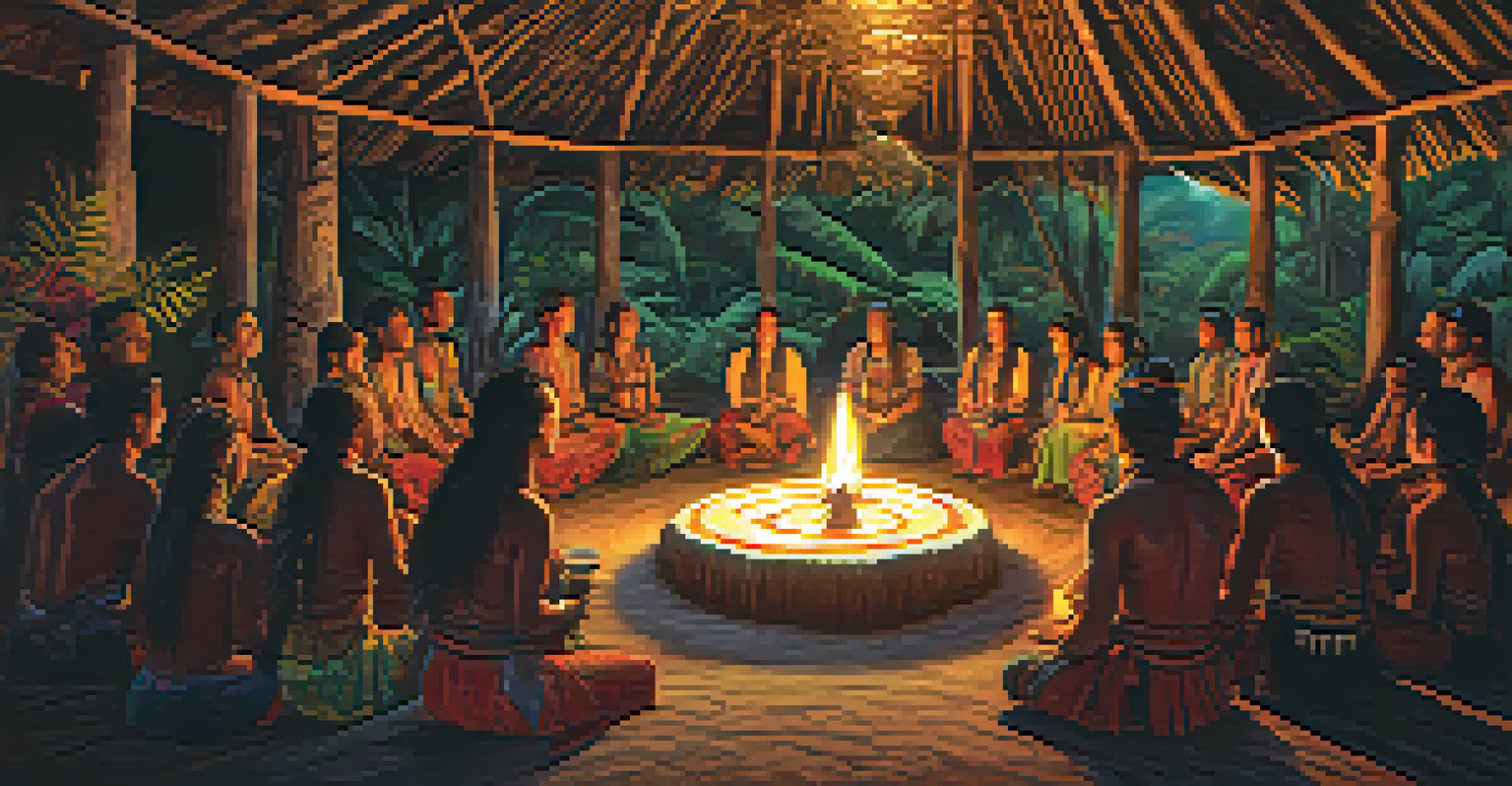Exploring Ayahuasca: Bridging Science and Spiritual Skepticism

Understanding Ayahuasca: A Brief Overview
Ayahuasca is a powerful brew made from the Banisteriopsis caapi vine and other plants, known for its psychoactive properties. Traditionally used by indigenous Amazonian tribes, it serves both spiritual and medicinal purposes. The experience often involves vivid visions and deep introspection, making it a fascinating subject for both science and spirituality enthusiasts.
The greatest medicine of all is teaching people how to care for themselves.
In recent years, Ayahuasca has gained popularity beyond its native roots, attracting people from various backgrounds seeking healing or spiritual enlightenment. This cultural crossover raises questions about authenticity and the ethical implications of its usage. As it becomes more mainstream, understanding its origins and traditional significance is crucial.
The brew contains DMT (dimethyltryptamine), a compound that alters perception and consciousness. This has led to increased scientific interest in its potential therapeutic effects, including treatment for depression, PTSD, and addiction. However, the blend of ancient practices and modern science creates a complex dialogue, inviting both curiosity and skepticism.
The Science Behind Ayahuasca: What Research Says
Recent studies have started to unravel the biochemical effects of Ayahuasca on the brain. Researchers have found that DMT can enhance neuroplasticity, potentially allowing individuals to rewire negative thought patterns. This has sparked interest in its use as a therapeutic tool, particularly for mental health disorders.

Clinical trials are now exploring Ayahuasca's efficacy in treating conditions like depression and anxiety. Preliminary results suggest that participants often report significant improvements in their mental health post-ceremony. However, more extensive research is needed to fully understand the long-term effects and safety of these treatments.
Ayahuasca's Healing Potential Explored
Research suggests that Ayahuasca may offer therapeutic benefits for mental health disorders like depression and PTSD.
Despite promising findings, skepticism remains. Critics argue that personal testimonies can be subjective and that more rigorous scientific methods are required to validate claims. This tension between anecdotal success and scientific scrutiny is a central theme in the ongoing exploration of Ayahuasca.
Spiritual Experience: What Participants Often Describe
Many individuals who partake in Ayahuasca ceremonies describe profound spiritual experiences. Participants often report feelings of connection to nature, heightened awareness, and a sense of unity with the universe. These experiences can be transformative, leading to personal insights and emotional healing.
Spirituality is not about being fixed, but about being whole.
The rituals surrounding Ayahuasca consumption typically involve guided ceremonies led by experienced shamans. These shamans play a vital role in creating a safe environment for participants to explore their consciousness. The integration of music, chanting, and traditional practices enhances the spiritual ambiance, fostering deeper connections.
However, these experiences can also be challenging. Some participants face intense emotional purging or confront deep-seated traumas during their journeys. This duality of healing and discomfort is often a topic of discussion among those considering Ayahuasca, emphasizing the importance of preparation and support.
Cultural Significance: Ayahuasca in Indigenous Traditions
For indigenous cultures in the Amazon, Ayahuasca is far more than a psychedelic experience; it's a sacred ritual steeped in tradition. Used for centuries, it forms an integral part of their spiritual and healing practices. Understanding this cultural context is essential for anyone interested in the brew’s potential benefits.
The shamans who guide these ceremonies are often seen as spiritual leaders, possessing extensive knowledge of the plants and their effects. Their role is crucial in navigating the complexities of the Ayahuasca experience, ensuring participants respect the traditions and intentions behind the ritual. This connection to culture adds depth to the understanding of Ayahuasca.
Cultural Context and Respect Needed
Understanding the indigenous traditions surrounding Ayahuasca is crucial to ensure respectful engagement and prevent cultural appropriation.
The rise of Ayahuasca tourism has sparked debates about cultural appropriation and the commercialization of sacred practices. As more people seek out these experiences, it's vital to acknowledge and honor the origins of Ayahuasca to prevent exploitation and preserve its cultural significance.
Ethical Considerations: The Risks of Ayahuasca Tourism
With the growing popularity of Ayahuasca, ethical concerns regarding its commercial use have surfaced. Many travelers flock to retreat centers in South America, often unaware of the complexities involved in these ceremonies. This has led to questions about the safety and integrity of such experiences.
Reports of participant exploitation, inadequate supervision, and irresponsible practices have emerged, raising alarms among advocates for ethical tourism. It’s essential for individuals considering Ayahuasca to research their chosen retreat thoroughly and ensure they engage with reputable facilitators. The risk of harm can be minimized through informed choices.
Moreover, the commodification of Ayahuasca experiences can dilute the spiritual essence of the ritual. By treating these ceremonies as mere adventures, we risk overshadowing the rich cultural heritage they represent. This calls for a more respectful approach to engaging with Ayahuasca and its traditions.
Skepticism and Criticism: Voices Against Ayahuasca Use
Despite the growing body of research supporting Ayahuasca's therapeutic potential, skepticism remains prevalent. Critics often point to the lack of standardized practices and the variability of individual experiences. Concerns about the psychological risks involved in such intense experiences are also frequently voiced.
Some mental health professionals caution against the use of Ayahuasca without proper guidance and integration support. They argue that not everyone is mentally or emotionally prepared for the profound experiences Ayahuasca can provoke. This highlights the importance of thorough screening and preparation for potential participants.
Ethical Concerns in Ayahuasca Tourism
The rise of Ayahuasca tourism raises ethical questions about participant safety and the commercialization of sacred practices.
Furthermore, the allure of Ayahuasca as a 'quick fix' for deep-seated issues can lead to disillusionment. The journey of healing and self-discovery is often complex and requires more than just a single experience. Acknowledging these risks helps create a balanced dialogue around Ayahuasca, promoting responsible engagement.
The Future of Ayahuasca: Bridging Science and Spirituality
As research into Ayahuasca continues to grow, the potential for bridging science and spirituality becomes more apparent. The challenge lies in integrating traditional knowledge with modern scientific methods to provide a comprehensive understanding of the brew's effects. This intersection could lead to new therapeutic approaches that honor both perspectives.
Future studies may focus on long-term effects and the mechanisms behind Ayahuasca's impact on mental health. By collaborating with indigenous communities, researchers can gain insights that enhance the scientific exploration while respecting cultural traditions. This partnership could pave the way for more ethical practices in Ayahuasca ceremonies.

Ultimately, the future of Ayahuasca relies on a balanced approach that respects its cultural roots while embracing scientific inquiry. This journey of exploration invites us to consider the broader implications of our understanding of consciousness, healing, and what it means to be human.